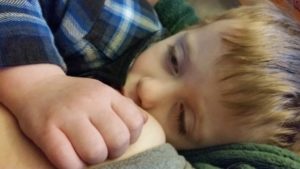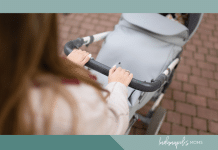I’ve always loved breastfeeding photos. The ones I’ve seen shared are absolutely beautiful. From selfies to professionally shot photographs, there’s just something magical about them. Here is my last breastfeeding photo. I took it during my son’s last nursing session, 10 days after his third birthday. If you had told me 1,106 days before that I would be nursing a 3-year-old, I never would’ve believed it. In the beginning, I was of a “until one and done” mindset – extended breastfeeding never even crossed my mind.

Pregnancy Thoughts on Breastfeeding
I always knew I wanted to breastfeed my baby. To me, it felt natural and the obvious choice for our family. I was lucky enough at that time to be surrounded by many women in my family who had breastfed recently; my sister-in-law, my then husband’s cousins, his mom had breastfed, and nursing a baby had just been a norm at our family events for the last several years. It felt comfortable, and I was fortunate enough not to have any serious negativity surrounding my wishes to breastfeed.
I also wanted to breastfeed for the same reason I cloth diapered my son – cost. Formula and diapers are not cheap! As a new entrepreneur who had just started a business, the commitment to breastfeed when my baby was born was a way I could help my family financially.
How Breastfeeding Affected Me
What I never expected about breastfeeding was how it evolved throughout my experience. In the beginning, it was feeding and bonding with my child. It was a comfort and it was nurturing.
 Breastfeeding and Postpartum Depression
Breastfeeding and Postpartum Depression
About four months in, breastfeeding was the bane of my existence. While still unbeknownst to me, I had developed postpartum depression and breastfeeding felt like a prison. It was my burden, I had to nurse my son for meals, to calm him, all while the idea of being touched and used for that made me feel resentful.
My husband was caring and supportive, he suggested I quit breastfeeding if it was contributing to how terrible I was feeling. I appreciated that support, but even so, I wanted to keep going. Luckily I sought treatment for PPD not long after the symptoms started, and it helped me to nurse on.
Also during this time, I started attending a breastfeeding support group at Hendricks Regional Hospital. I didn’t really have any technical issues breastfeeding. I joined the support group because I felt very isolated as a new mom with PPD. As a work at home mom, I needed to be around some people. This was one of the best decisions I have ever made, as this group introduced me to so many amazing women who I’m still friends with four years later. Breastfeeding and kids about the same age were our common bonds, their kids became my son’s friends just as much as the moms were my friends. It was at the support group that I heard other mothers’ plans to do extended breastfeeding past age one – something I’d never really considered.
Breastfeeding and Co-Sleeping
During my son’s first year, nursing seemed to be the only way to get him to sleep. He was not a “good” sleeper and woke at least 4 times a night most nights. Each time, I would be up feeding him. Sometimes we’d nurse and I’d go back to bed, only to be up an hour or less later. The lack of sleep and the burden of being the only one who could get him back to sleep took its toll on me.
About seven months in, I finally figured out how to deal: co-sleeping. I was scared to death to co-sleep, afraid that in my sleep I would injure him or worse. I couldn’t take the lack of sleep anymore and eventually found a way that worked and that both my husband and I were comfortable with.
My son would go to bed in his crib, and when he woke for the first time, he and I would move to the couch. I’d lay snugly against the back of the couch and held him with my arm as he lay atop me nursing. I could fall back asleep as he did, and when he’d wake again, we were already set up to nurse again. Removing the up and down, getting out of bed and turning on lights, this helped me sleep much better even if I was still waking several times each night.
Extended Breastfeeding After One
After my son’s first birthday, I stopped worrying about him having breastmilk if I wasn’t there to give it to him. I ditched the pump and the stress of providing enough milk for the few times I wouldn’t be around to feed him. I also rarely nursed him in public after this point, alleviating the stress of having to stop what I was doing and the potential judgment of strangers, which luckily I’d never experienced.
Breastfeeding became less about nourishment and more about comfort. Get upset? Have a nurse. Get hurt? Have a nurse. Snuggling near a boob? Have a nurse.
I found I really wasn’t breastfeeding any less after my son turned one because he became insistent about nursing when he wanted to. During this year, he was almost demanding, reaching down my shirt and even bashing his mouth against my chest – the sound he made when doing this is how we came up with our word for breastfeeding: “Ahbwahs.”
My son also became less reliant on nursing to fall asleep during this year, which gave me more freedom. He still had issues with waking during the night, but we were down to one or two times with nursing him back to sleep, which made a big difference in my sleep and sanity. Around age two, we started a system where the first time he woke at night, my husband would go get him and put him in bed with us. I’d roll the opposite way and pretend not to be there, and he’d fall back asleep with my husband, unaware that there were boobs about. Eventually, this led to straight up co-sleeping and going to bed with us in our bed.
Between two and three, nursing became less frequent. It was maybe in the morning, before a nap, before bed, and a few scattered times thrown in there some days. It was nice and easy, but frustrating to me when he’d become demanding. Even so, breastfeeding had always gone fairly smooth for us, so there was no real reason to stop.
Breastfeeding: The End of an Era
As we approached three, I started to think about when we would stop nursing. My husband started to ask me when I would stop and my default answer would be three. When three rolled around, my husband took more of a hard stance about it, and truthfully I was ready.
Our last extended breastfeeding session was 10 days after my son’s third birthday, January 18th, 2017. After we came home from preschool, I told him that since he was a big boy now (he’s always responded very well to the “big boy” talk), mommy’s milk was about all gone. So, we were going to sit down and nurse, but this would be the last time and then there would be no more milk. I told him he could nurse for as long as he wanted to this time, but then we would be done for good.
Sitting in the chair snuggling my toddler during his last nursing session was a mixed bag of emotions, and I’d been emotional about it for the days leading up to it. Breastfeeding had become so much more than just feeding my son – it was more like my way of life at that point. It was what I did, it was how I made my friends, it was my bond with my son.
I’d miss the way he’d sweetly lay on me and nurse, miss the cute sounds and those little hands squeezing milk out, miss him giggling as he nursed – which was the cutest thing ever. I wouldn’t miss his demanding to nurse and throwing a tantrum when I’d say no.
Once he was finished that day, he unlatched and said, “bye bye, ahbwahs.” And that was that, we’d come to the end of an era.
I definitely believe it helped to stop breastfeeding when my son was older. He understood the explanation I gave him of why to stop, so it wasn’t like I was taking something away from him. That is a high perk of extended breastfeeding.
Breastfeeding was such a beautiful, yet hard experience for me. Continuing to nurse my son until age three seemed completely natural and normal to me. I was lucky to have excellent support, no significant issues, and nearly no criticism throughout my extended breastfeeding journey, but I know this is not the case for everyone.








